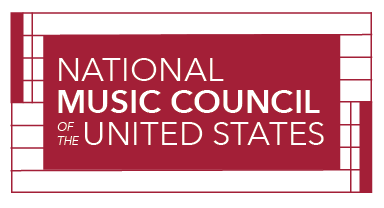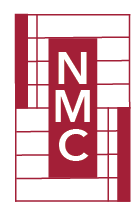Ray and Vivian Chew with the American Eagle Award
Photo Credit: Fred Morledge
The National Music Council of the United States presented its 2023 American Eagle Award to music visionaries Ray Chew and Vivian Scott Chew on Sunday, June 25, 2023, at the American Federation of Musicians Convention in Las Vegas. The honor is presented each year in recognition of those who have made career-long contributions to American musical culture, to promoting the ideal of music education for all children, and to supporting the protection of creators’ rights both locally and internationally. The Chews were honored “in recognition of their longstanding commitment to fostering and providing excellence in American musical performance and education, and for the inspiration they have consistently generated throughout the global music community by their dedication to the ideal of equal opportunity for all.”
This year’s special presenter was Academy Award and multi-Grammy-winning artist Regina Belle. Her tribute to the Chews included an emotional performance of So Glad I Got You, a song written by her late brother, Bernard Belle, which she dedicated to the couple. She was accompanied on piano by her nephew, Tyrone Belle.
Iconic Music Director, Producer and Composer Ray Chew’s work has been celebrated for excellence both in front of the camera and behind the scenes over the course of decades, ranging from the most important special holiday broadcasts on NBC to award-winning shows including Dancing With the Stars, Showtime at the Apollo, and American Idol. Ray’s uniquely-prized music direction talents have been further highlighted in prestigious musical specials and historic landmark events, including the Primetime Emmy Awards, the Grammy Awards Premiere Ceremonies, the 2008 Democratic National Convention, President Barack Obama’s Inaugural Ball, the NAACP Image Awards, Miss Universe, Miss USA, Miss America and the BET Awards.
Among the list of globally renown artists with whom Ray has worked include Rihanna, Carrie Underwood, Pharrell Williams, Justin Bieber, Aretha Franklin, Lenny Kravitz, Pitbull, Queen Latifah, James Taylor, Pastor Shirley Caesar, Jennifer Hudson and Quincy Jones. His reputation as one of the most sought-after collaborative talents in the global music industry is rivaled only by his commitment to passing along the benefits of his experiences to future generations of composers, arrangers, performers and producers.
Vivian Scott Chew is an equally innovative figure in the global music and entertainment industry, with an accomplished history at ASCAP, Polygram Records and Sony Music, and as co-founder and principal of TimeZone International – the first U.S. based African-American owned company that provides recording artists with international marketing and promotion services in expanded regions.
Ray and Vivian are likewise founding partners in Chew Entertainment – a premiere event production firm whose work includes the annually acclaimed “A Night of Inspiration” at Carnegie Hall, an all-star concert that promotes diversity and unity at the famed venue with a 64-piece orchestra and massive choir for notable artists from the gospel and secular communities. The couple similarly remains steadfast in their commitment to philanthropy through both the Power 2 Inspire Foundation, which they created to identify and nurture the future of music creators and industry leaders, and by fundraising efforts in partnership with the American Federation of Musicians to benefit out of work musicians affected by the Covid-19 pandemic. For more information, visit www.power2inspire.org and https://www.youtube.com/@allthingschew.
This year’s honorees join a “who’s – who” of musical giants whose careers and works have been previously awarded the American Eagle, including Stephen Sondheim, Quincy Jones, Herbie Hancock, Clive Davis, Benny Goodman, Lionel Hampton, Dizzy Gillespie, Morton Gould, Dave Brubeck, Marian Anderson, Max Roach, Lena Horne, Roy Clark, Crystal Gale, George Clinton, Ervin Drake, Theo Bikel, Vince Guaraldi, Roberta Peters, Odetta, Patti Smith, Sesame Street, Hard Rock Café, and Save the Music Foundation.
Click here for more photos of the 2023 Eagle Awards
The National Music Council
The Congressionally-chartered National Music Council is celebrating its 82nd year as a forum for the free discussion of this country’s national music affairs and challenges. Founded in 1940 to act as a clearinghouse for the joint opinion and decision of its members and to work to strengthen the importance of music in our lives and culture, the Council’s initial membership of 13 has grown to almost 50 national music organizations, encompassing every important form of professional and commercial musical activity. Through the cooperative work of its member organizations, the National Music Council promotes and supports music and music education as an integral part of the curricula in the schools of our nation, and in the lives of its citizens. The Council provides for the exchange of information and coordination of efforts among its member organizations and speaks with one voice for the music community whenever an authoritative expression of opinion is desirable. www.musiccouncil.org
In 2023, the National Music Council produced a landmark Symposium addressing the recent spike in political violence against songwriters, composers and music performers throughout the world. The webcast, “Protecting Free Speech in the Global Music Landscape” premiered on Music Freedom Day and was produced in cooperation with the International Music Council. It featured discussions and interviews with many of the world’s leading experts and activists on free speech issues as they pertain to the music and music education communities. Panel topics included Movements to Protect Free Speech in Music; Trends in Politically-based Censorship of the Musical Arts, and The History of Music’s Political Influence and of Governmental Attempts to Harness, Control and Silence It. A compendium briefing paper tracing the history of global music repression was prepared by NMC Chair Charles J. Sanders, containing dozens of links to musical sources, and providing music community members with the opportunity to incorporate the lessons of the past into their ideas for forging a less dangerous future for songwriters, composers, recording artists and performers. The symposium and briefing paper are currently viewable on the NMC website.
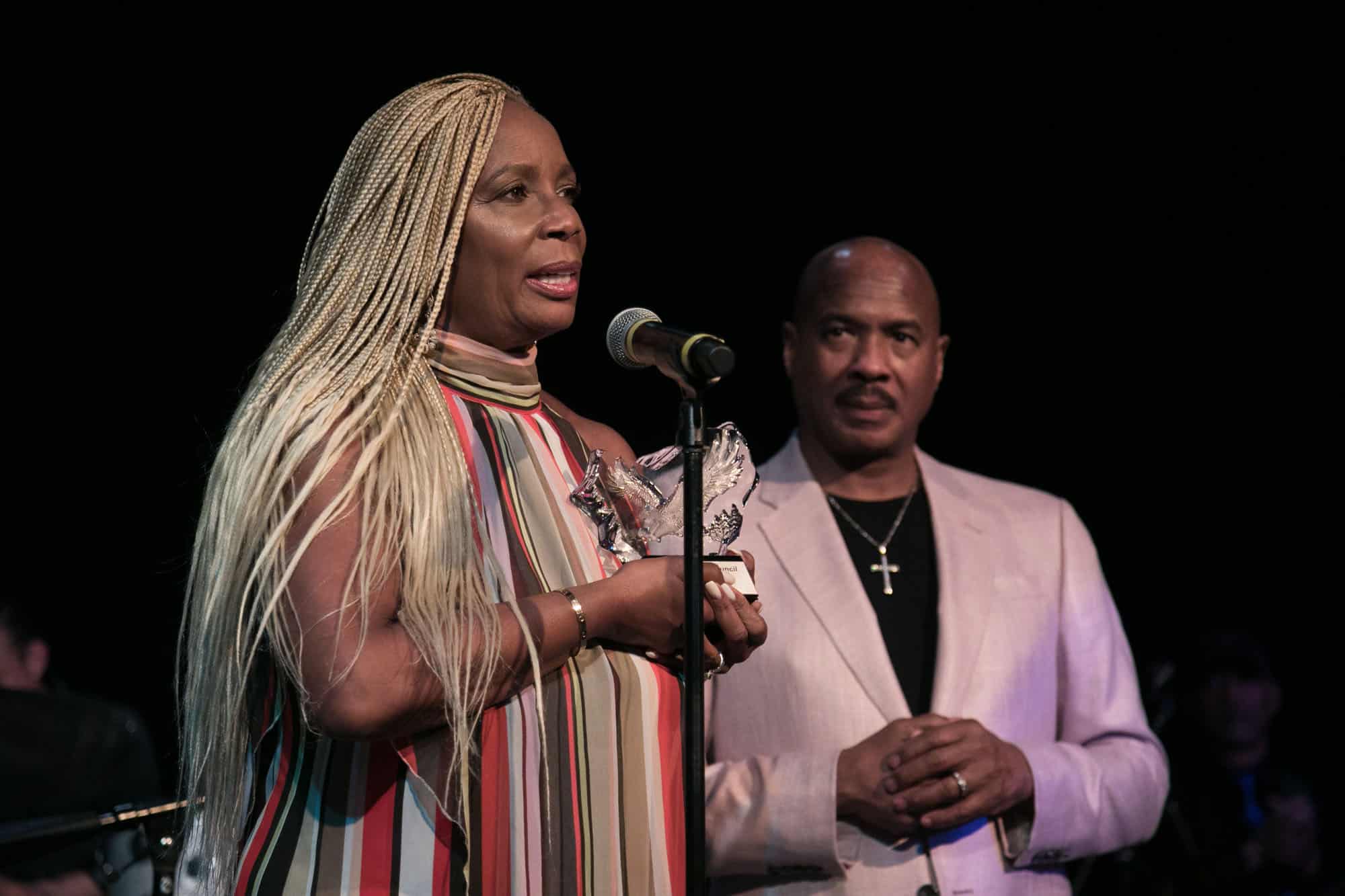
Vivian and Ray Chew accept the 2023 American Eagle honor
Photo Credit: Fred Morledge
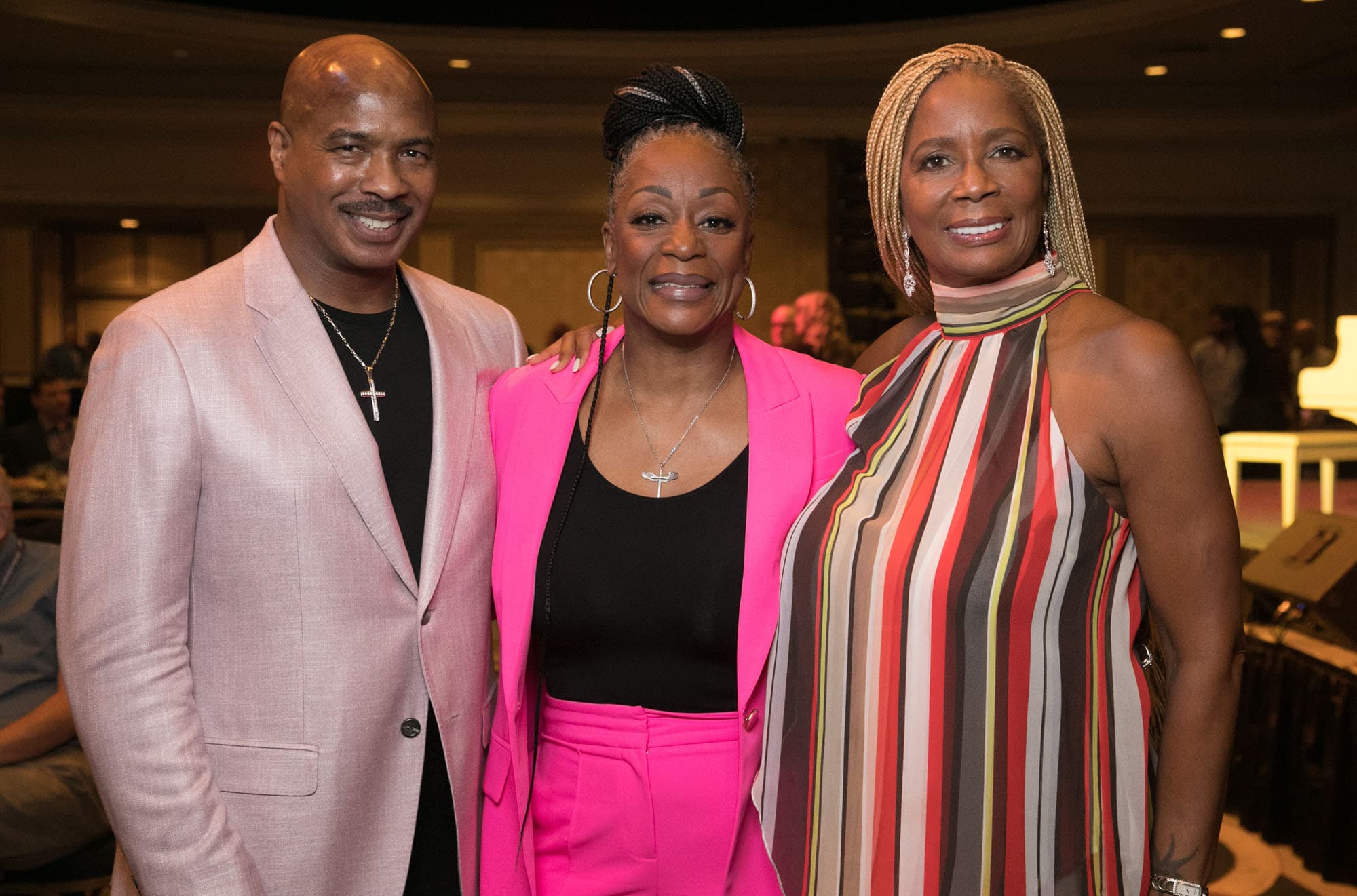
Ray Chew, Regina Belle, and Vivian Scott Chew
Photo Credit: Fred Morledge
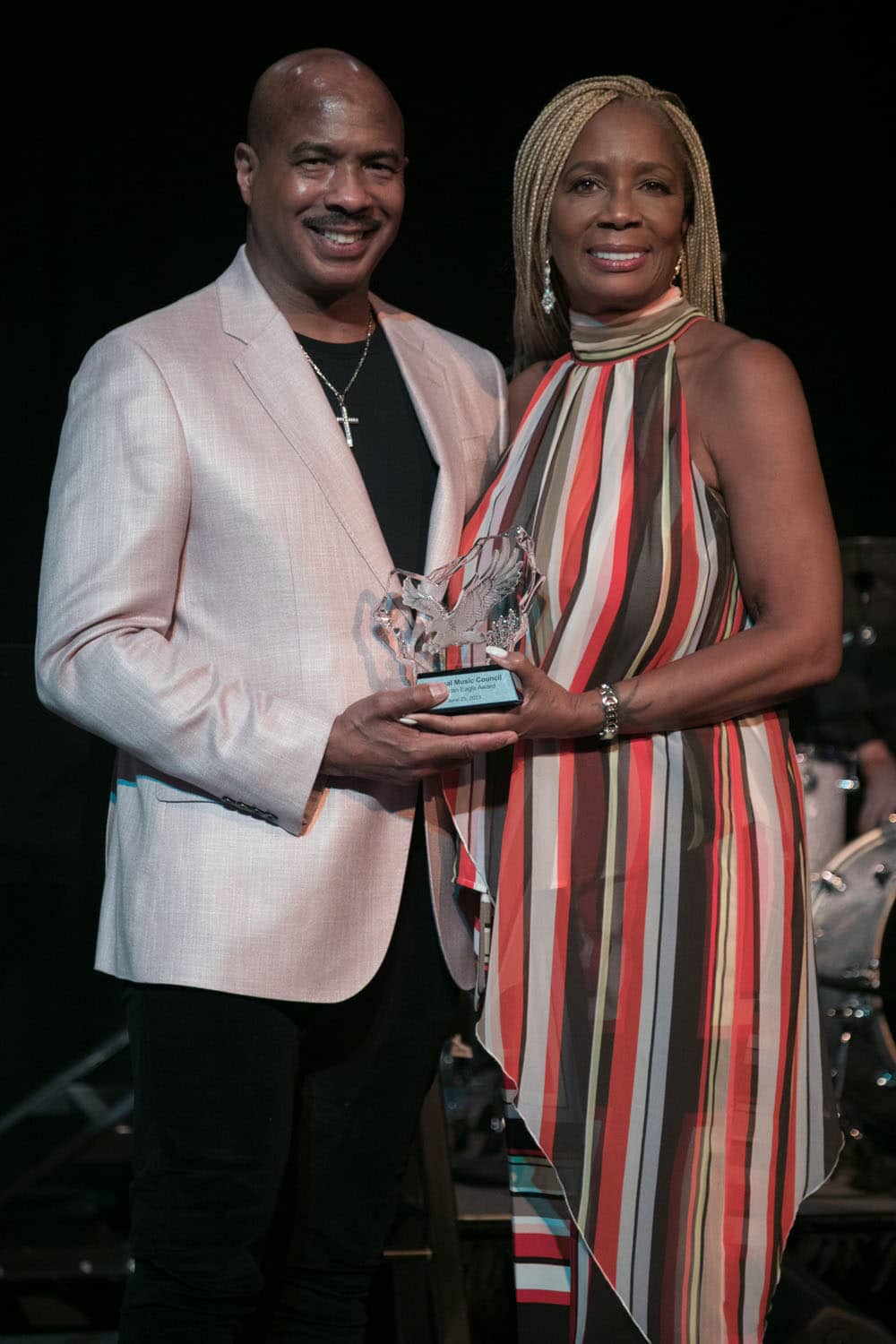
Ray and Vivian Chew with the American Eagle Award
Photo Credit: Fred Morledge
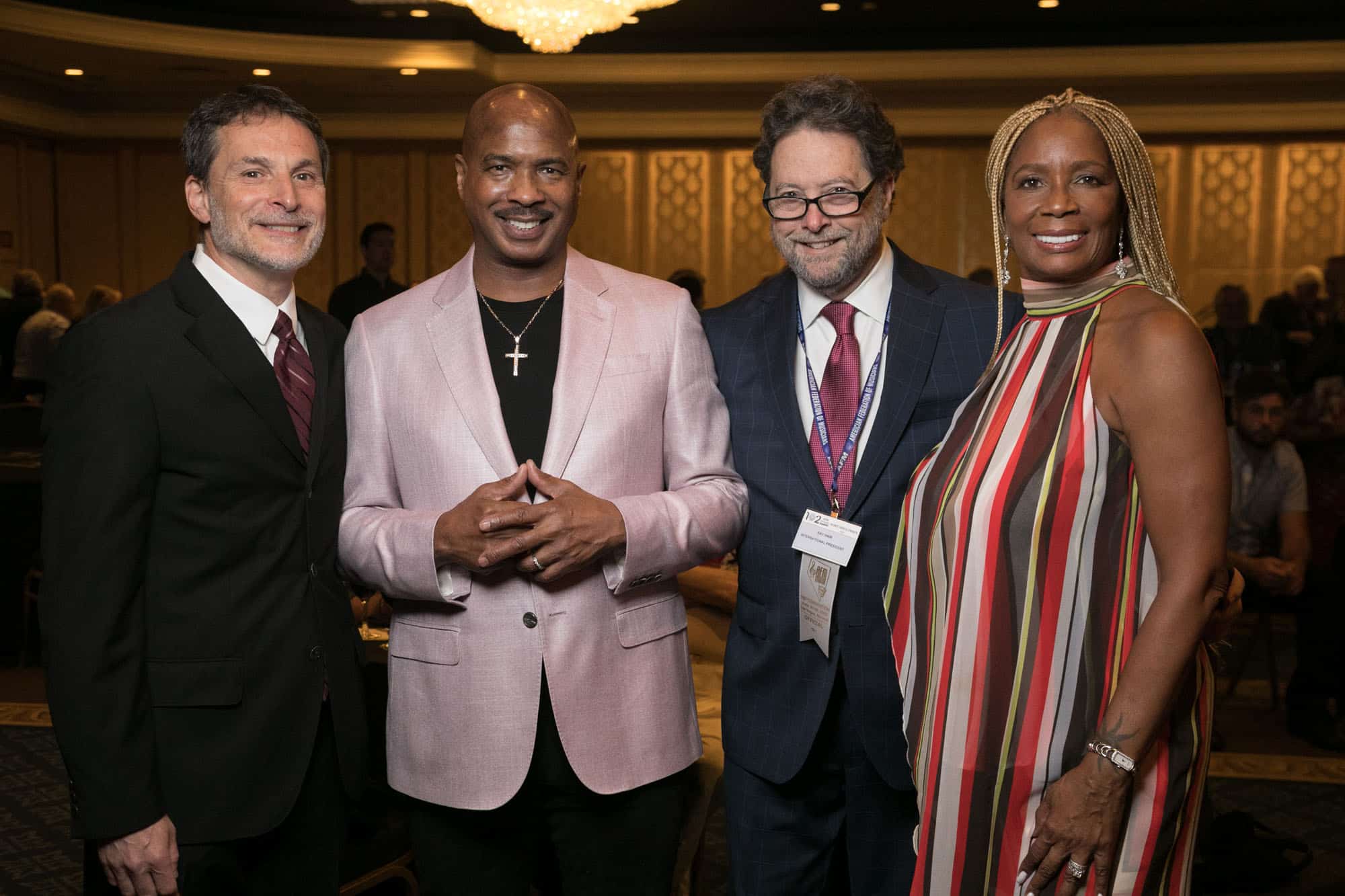
NMC Director David Sanders, Ray Chew, AFM President Ray Hair, and Vivian Scott Chew
Photo Credit: Fred Morledge
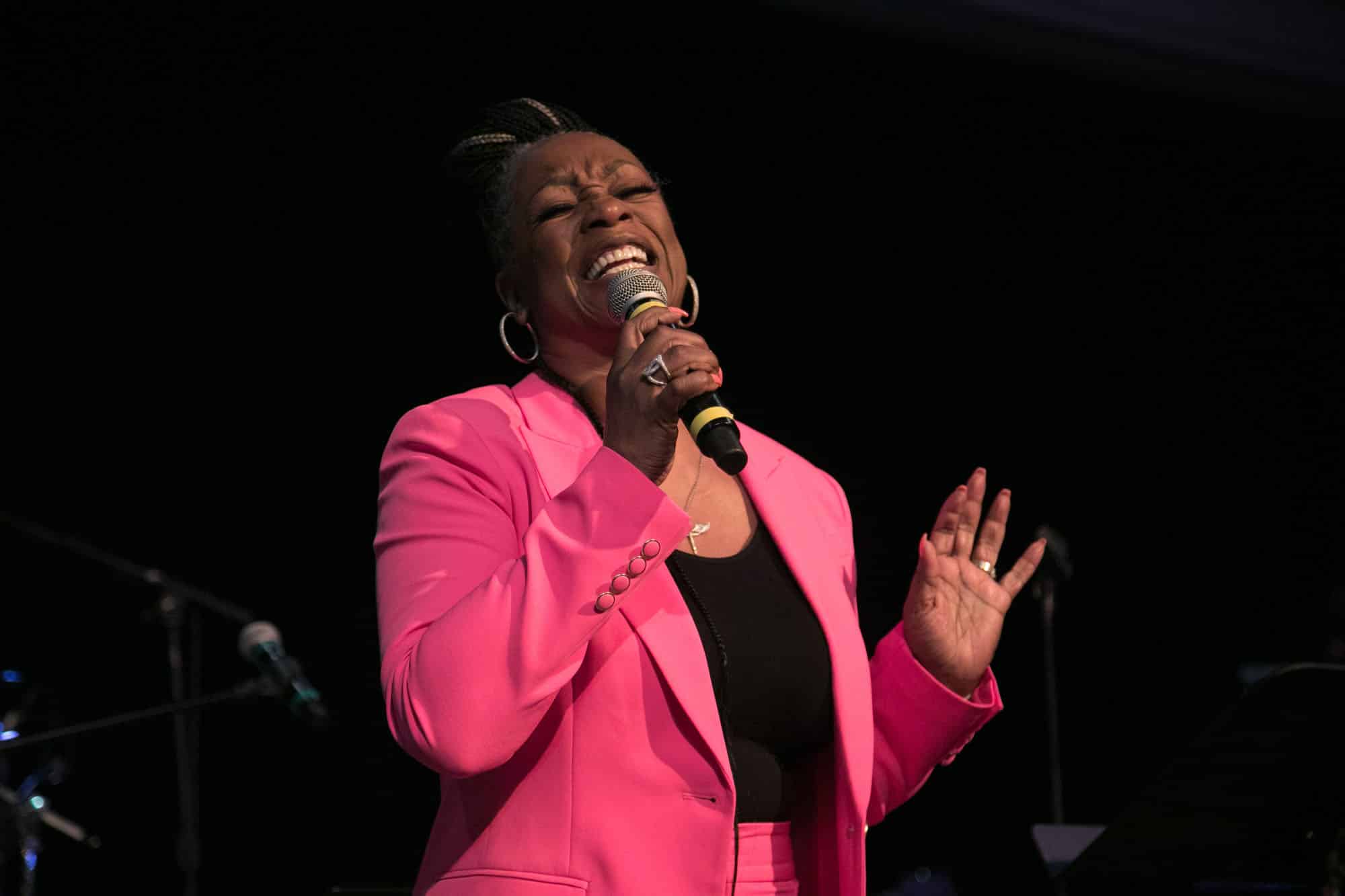
Regina Belle performing the musical tribute to the honorees
Photo Credit: Fred Morledge
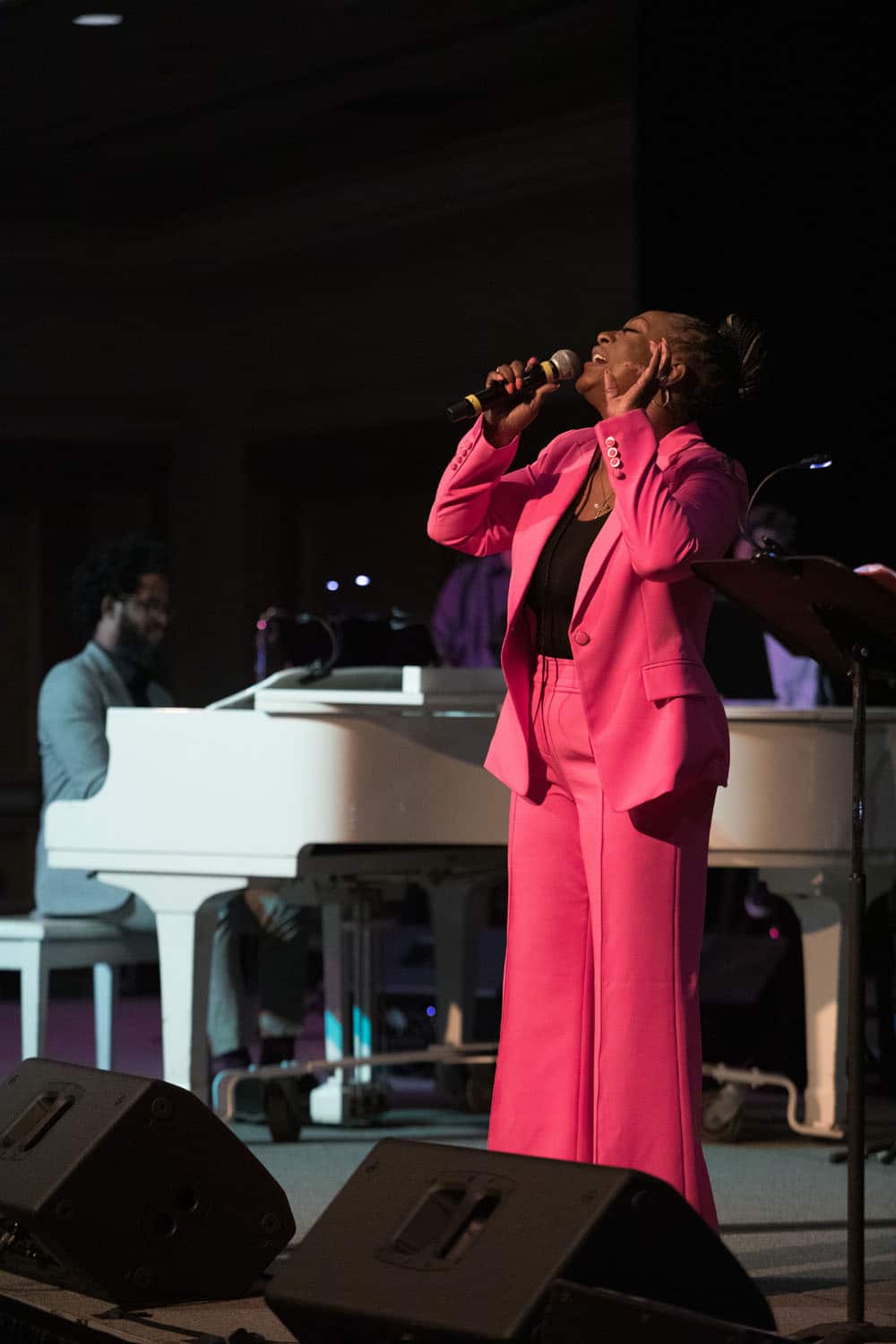
Regina Belle with Tyrone Belle on piano for the musical tribute
Photo Credit: Fred Morledge
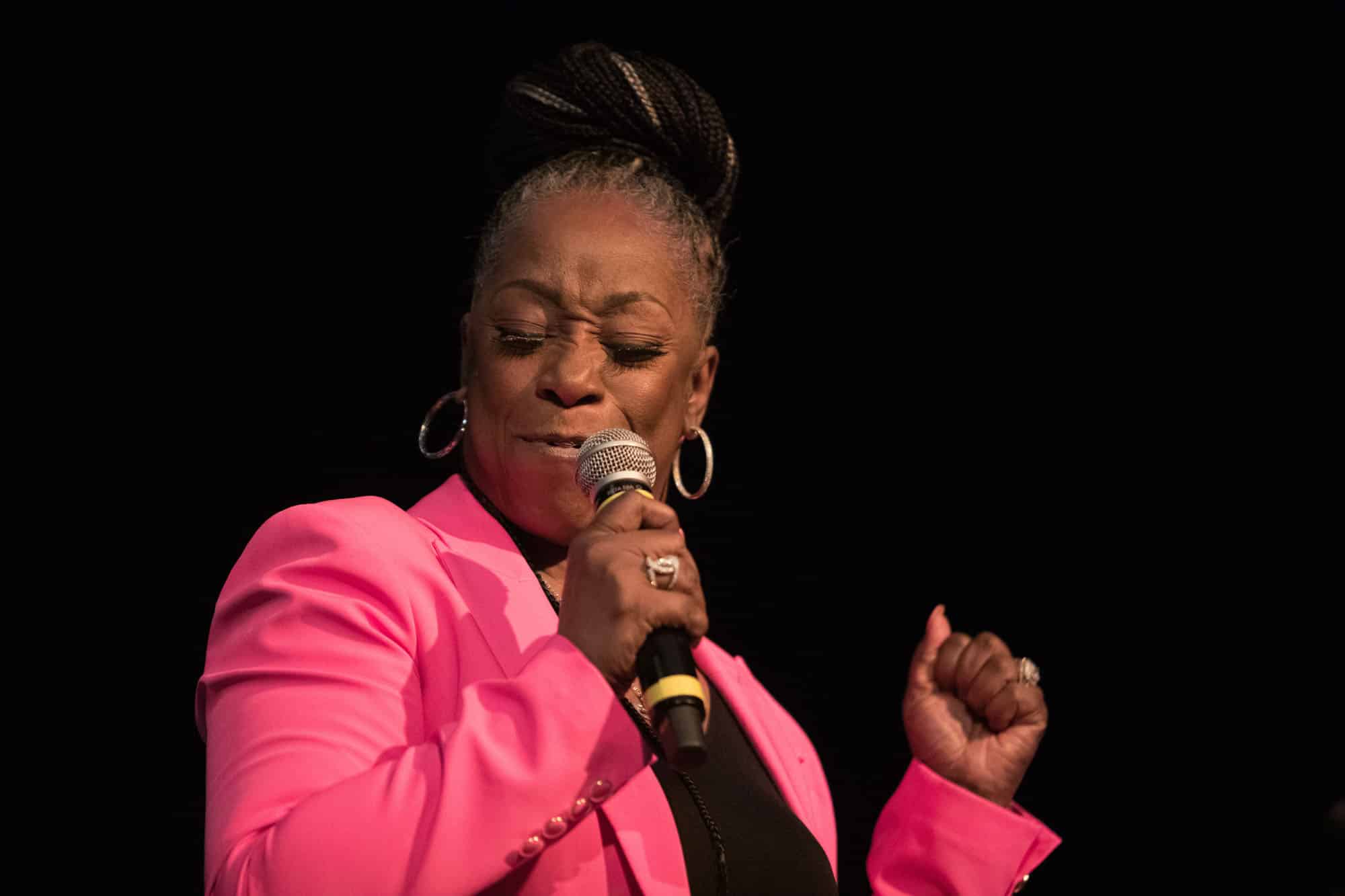
Regina Belle
Photo Credit: Fred Morledge
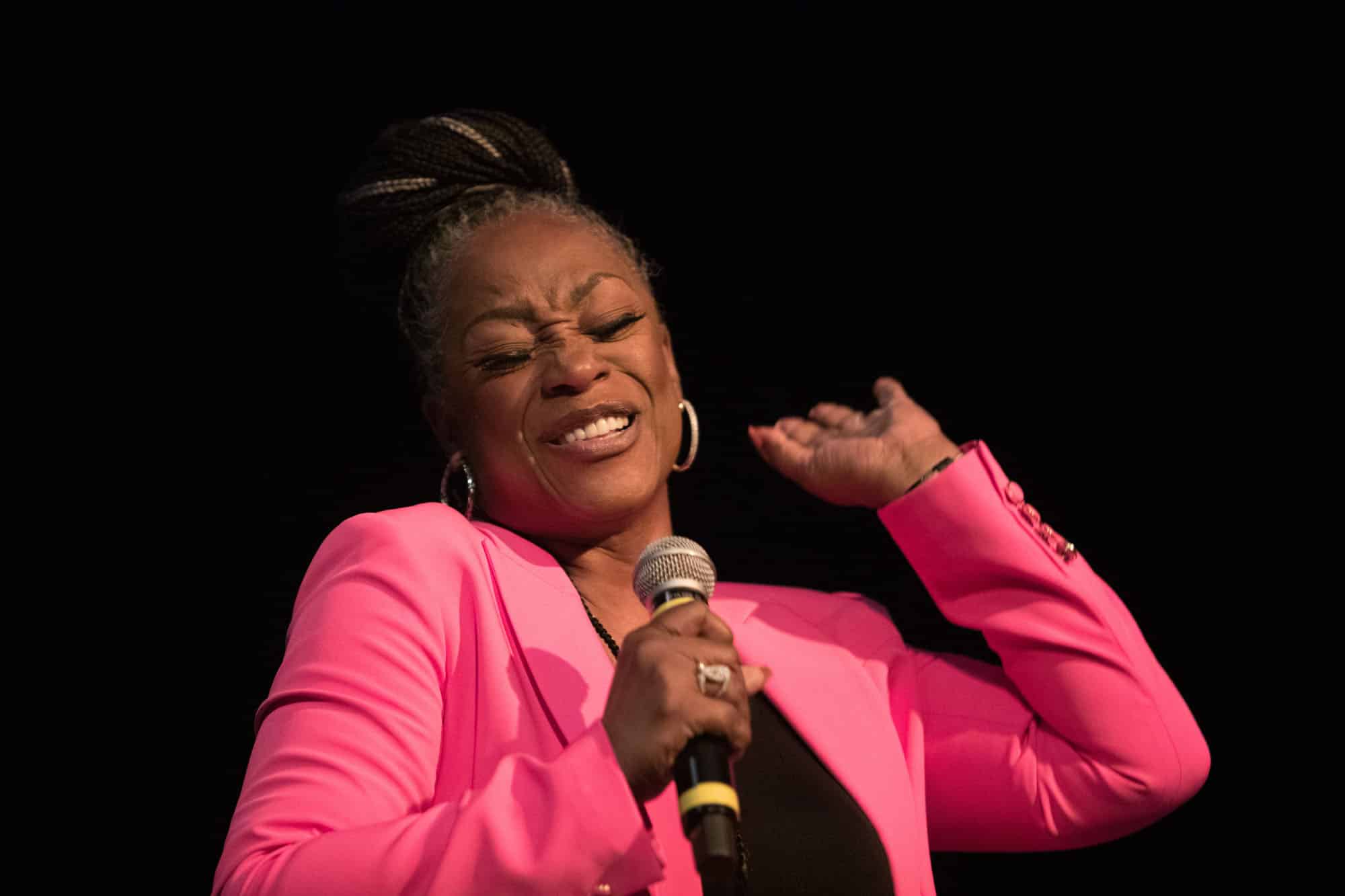
Regina Belle
Photo Credit: Fred Morledge
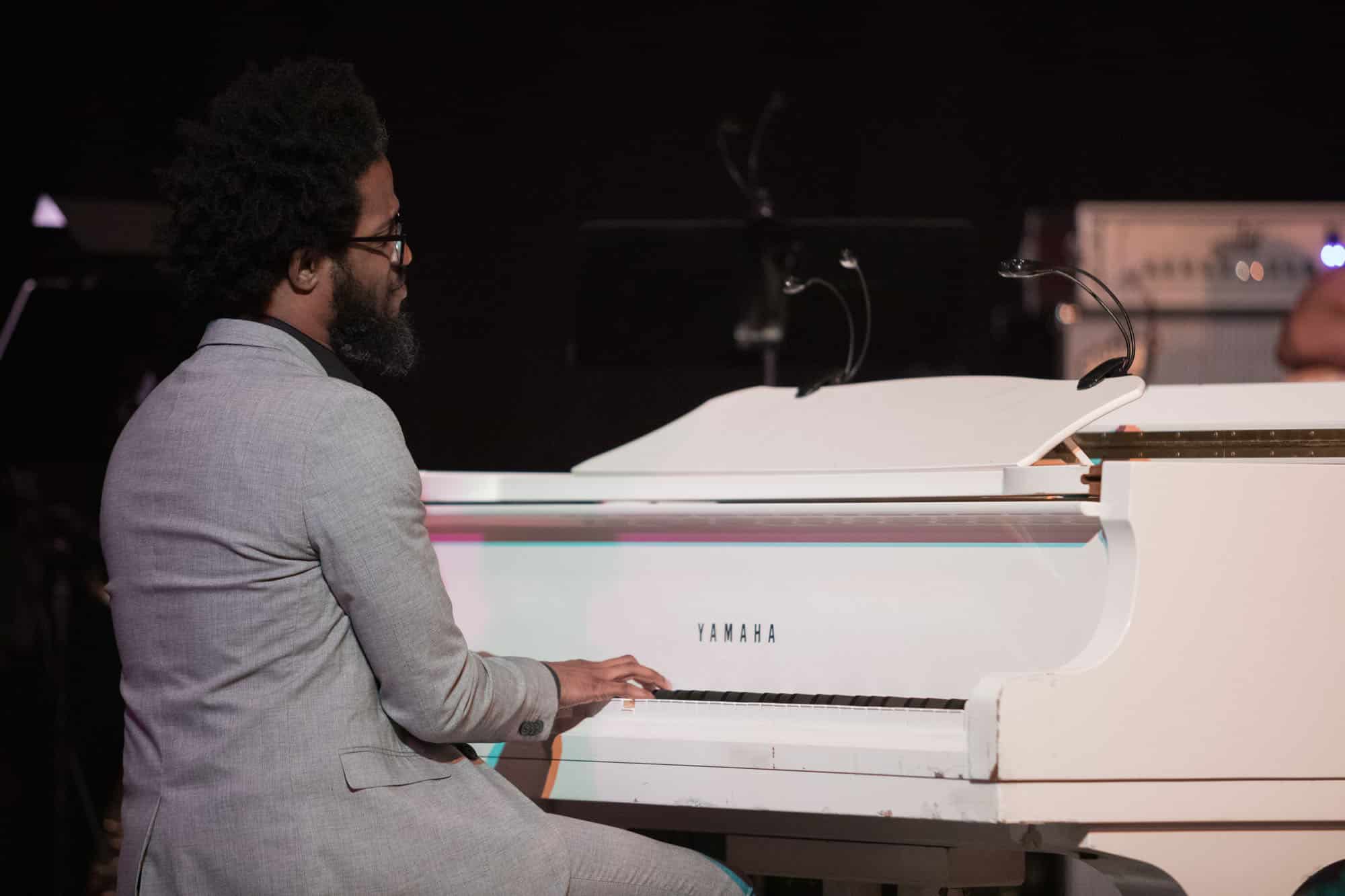
Tyrone Belle at the piano
Photo Credit: Fred Morledge
The National Music Council of the United States is proud to announce it will honor music visionaries Ray Chew and Vivian Scott Chew at the organization’s 39th annual American Eagle Awards on Sunday, June 25, 2023, at the American Federation of Musicians Convention in Las Vegas. The honors are presented each year in recognition of those who have made career-long contributions to American musical culture, to promoting the ideal of music education for all children, and to supporting the protection of creators’ rights both locally and internationally. This years’ honored presenter will be Academy Award and multi-Grammy-winning artist Regina Belle.
Iconic Music Director, Producer and Composer Ray Chew’s work has been celebrated for excellence both in front of the camera and behind the scenes over the course of decades, ranging from the most important special holiday broadcasts on NBC to award-winning shows including Dancing With the Stars, Showtime at the Apollo, and American Idol. Ray’s uniquely-prized music direction talents have been further highlighted in prestigious musical specials and historic landmark events, including the Primetime Emmy Awards, the Grammy Awards Premiere Ceremonies, the 2008 Democratic National Convention, President Barack Obama’s Inaugural Ball, the NAACP Image Awards, Miss Universe, Miss USA, Miss America and the BET Awards.
Among the list of globally renown artists with whom Ray has worked include Rihanna, Carrie Underwood, Pharrell Williams, Justin Bieber, Aretha Franklin, Lenny Kravitz, Pitbull, Queen Latifah, James Taylor, Pastor Shirley Caesar, Jennifer Hudson and Quincy Jones. His reputation as one of the most sought-after collaborative talents in the global music industry is rivaled only by his commitment to passing along the benefits of his experiences to future generations of composers, arrangers, performers and producers.
Vivian Scott Chew is an equally innovative figure in the global music and entertainment industry, with an accomplished history at ASCAP, Polygram Records and Sony Music, and as co-founder and principal of TimeZone International – the first U.S. based African-American owned company that provides recording artists with international marketing and promotion services in expanded regions.
Ray and Vivian are likewise founding partners in Chew Entertainment – a premiere event production firm whose work includes the annually acclaimed “A Night of Inspiration” at Carnegie Hall, an all-star concert that promotes diversity and unity at the famed venue with a 64-piece orchestra and massive choir for notable artists from the gospel and secular communities. The couple similarly remains steadfast in their commitment to philanthropy through both the Power 2 Inspire Foundation, which they created to identify and nurture the future of music creators and industry leaders, and by fundraising efforts in partnership with the American Federation of Musicians to benefit out of work musicians affected by the Covid-19 pandemic. For more information, visit www.power2inspire.org and https://www.youtube.com/@allthingschew.
This year’s honorees will join a “who’s – who” of musical giants whose careers and works have been previously awarded the American Eagle, including Stephen Sondheim, Quincy Jones, Herbie Hancock, Clive Davis, Benny Goodman, Lionel Hampton, Dizzy Gillespie, Morton Gould, Dave Brubeck, Marian Anderson, Max Roach, Lena Horne, Roy Clark, Crystal Gale, George Clinton, Ervin Drake, Theo Bikel, Vince Guaraldi, Roberta Peters, Odetta, Patti Smith, Sesame Street, Hard Rock Café, and VH1’s Save the Music Foundation.
For more information on schedule, location details, tickets, and sponsorship opportunities, visit www.musiccouncil.org or contact NMC Director David Sanders at sandersd@montclair.edu.
Proceeds from the event support the National Music Council’s music education advocacy efforts.
The National Music Council
The Congressionally-chartered National Music Council is celebrating its 82nd year as a forum for the free discussion of this country’s national music affairs and challenges. Founded in 1940 to act as a clearinghouse for the joint opinion and decision of its members and to work to strengthen the importance of music in our lives and culture, the Council’s initial membership of 13 has grown to almost 50 national music organizations, encompassing every important form of professional and commercial musical activity. Through the cooperative work of its member organizations, the National Music Council promotes and supports music and music education as an integral part of the curricula in the schools of our nation, and in the lives of its citizens. The Council provides for the exchange of information and coordination of efforts among its member organizations and speaks with one voice for the music community whenever an authoritative expression of opinion is desirable. www.musiccouncil.org
In 2023, the National Music Council produced a landmark Symposium addressing the recent spike in political violence against songwriters, composers and music performers throughout the world. The webcast, “Protecting Free Speech in the Global Music Landscape” premiered on Music Freedom Day and was produced in cooperation with the International Music Council. It featured discussions and interviews with many of the world’s leading experts and activists on free speech issues as they pertain to the music and music education communities. Panel topics included Movements to Protect Free Speech in Music; Trends in Politically-based Censorship of the Musical Arts, and The History of Music’s Political Influence and of Governmental Attempts to Harness, Control and Silence It. A compendium briefing paper tracing the history of global music repression was prepared by NMC Chair Charles J. Sanders, containing dozens of links to musical sources, and providing music community members with the opportunity to incorporate the lessons of the past into their ideas for forging a less dangerous future for songwriters, composers, recording artists and performers. The symposium and briefing paper are currently viewable on the NMC website.
As an important feature of the landmark, NMC/IMC joint Symposium on Protecting Free Speech in Music scheduled to premiere on March 3rd in conjunction with international Music Freedom Day, a briefing paper tracing the history of global music repression will be made available to the public for the very first time. The compendium, prepared by NMC Chair Charles J. Sanders and containing dozens of links to musical sources, will serve to provide music community members with the opportunity to incorporate the lessons of the past into their ideas for forging a less dangerous future for songwriters, composers, recording artists and performers.
“We’ve all seen the current headlines from around the world,” the document begins. “Musicians and composers attacked as rabble-rousers and enemies of the state. Singers arrested, their performances banned as dangerous, un-patriotic or sacrilegious. Most recently, we’ve even seen lethal attacks committed against music creators for refusing to perform, or simply for attempting to entertain, not even to proselytize or lampoon. On this subject, the mission of the global music community is clear. We must quickly and effectively formulate ways to help curb this despicable trend.”
According to the report’s author, however, it’s also incumbent on us to recognize that such dangers have plagued humankind’s composers and troubadours for centuries. “Finding sustainable solutions to this newest spike in violence and repression will require our community to evaluate approaches to these threats with a careful eye on history.” Past events addressed in the paper include the banning of musical works and coercive or physical attacks on creators during the US Civil War, the Native American Genocide, the Great Depression and World Wars I and II, other murderous actions in fascist Spain, Nazi Germany, and Imperial Japan, brutal suppression in Soviet Russia and during the Chinese Cultural Revolution, outrageous acts of violence under the Pinochet Regime, the Khmer Rouge, and in Apartheid South Africa, and up to and including current, tragic events in Ukraine and Afghanistan.
“The historical pattern of musical repression is actually a simple one to understand. Music’s dual, facile ability to serve as both a powerful tool of propaganda and as an existential threat to power structures and political leaders has made it a prime focus of nervous governmental concern over the entire span of history. As a result, when it comes to music, whether we’re dealing with instances of governmental coercion, repression, violence or all three in combination, whatever we are seeing now the world has seen before. That fact itself creates an opportunity for more expeditiously finding the best way forward.”
The paper concludes with the assertion, “that crucial process is our responsibility to undertake” and it begins with the aphorism past is prologue. Stated another way, as the great novelist William Faulkner once sagely observed, the past is not dead. It is not even past.”
The National Music Council of the United States (NMC), in collaboration with its global partner, the Paris-based International Music Council (IMC), is proud to announce the premiere on March 3, 2023 at 9 am EST of a landmark Symposium addressing the recent spike in political violence against songwriters, composers and music performers throughout the world. The webcast, which will be available to viewers at musiccouncil.org, represents a key component of the global March 3rd Music Freedom Day observances. Details concerning subsequent access to materials will be available on the site.
The program will feature discussions and interviews with many of the world’s leading experts and activists on free speech issues as they pertain to the music and music education communities. Panel topics will include Movements to Protect Free Speech in Music; Trends in Politically-based Censorship of the Musical Arts, and; The History of Music’s Political Influence and of Governmental Attempts to Harness, Control and Silence It. The Symposium’s website will also feature a first-of-its-kind article compiled by NMC chair Charles J. Sanders –entitled “Music, Politics and History”– which traces the global timeline of music suppression and includes dozens of links to musical examples and accounts of incidents.
According to a joint statement issued by Sanders and NMC president James Weaver, “We believe this to be the first international, music community-sponsored forum ever held outside of Europe to address this crucial topic, and NMC is proud to have joined with its IMC colleagues in bringing it to fruition. The ability in the US and Canada to speak out on such issues, principally without fear of government reprisal, places on us a special responsibility to shine a brighter light on these escalating injustices and attacks. Music creators and performers have always been vulnerable targets for coercion and repression. Our community’s responsibilities are to ensure that such anti-democratic activities not remain hidden in the shadows, no matter where in the world they occur—including within our own borders.”
In summing up his own organization’s hopes for what the Symposium will accomplish in terms of future action, IMC president Alfons Karabuda adds that “we have seen in recent months and years the murder, displacement and economic sanctioning of composers, conductors, musicians and other members of our international community in various places across the globe. Our fellow music creators and artists who find themselves in these disastrous political crossfires are urgently in need of our help. We are exquisitely sensitive to the diplomatic nuances required to avoid exacerbating the dangers they face, and will exercise sound judgement in consultation with the victims in each case. History, however, teaches that silence is neither an acceptable nor effective strategy.”
A White Paper from Avant-Garde Lawyers
Russia’s invasion of Ukraine in February 2022 has resulted in severe violations of rights guaranteed under international law, the impact of which cannot be overstated. At Avant-Garde Lawyers (AGL), we are in solidarity with the people of Ukraine and are committed to providing specialized support to vulnerable artists on both sides of the border in this geopolitical conflict.
The intensity of suffering and devastation inflicted in the war has brought together communities across the globe in an effort to publicly condemn the use of violence by Russia. In this context, in the fields of arts and culture, a pattern has emerged in which national institutions, international festivals, exhibitions, competitions and orchestras have presented Russian artists with peremptory termination statements informing them of the unilateral revocation of their engagements on account of their nationality. Most of these institutions failed to provide the affected artists with any form of compensation or opportunities to discuss or contest their exclusion. While many stated that their intention was not to penalize individual artists, this is precisely what the exclusions have factually achieved.
Understandably, cultural institutions feel the need to publicly condemn Russia’s actions, but decisions to exclude Russian artists were also taken in an attempt to avoid negative repercussions in the form of economic or reputational loss. Overall, these measures and the way in which they were taken raise concerns about the lack of understanding among cultural institutions of the question of “sanctions” and their negative implications for the affected artists, for the institutions themselves, and more broadly for the freedom of artistic expression.
It is in light of these concerns that we publish this White Paper to provide information and analysis to assist cultural institutions in navigating the complexities of the situation. We do so through the lens of fundamental rights as guaranteed under international law. For us, at AGL, this is an important discussion that must be kickstarted amongst key stakeholders to avoid the further targeting of Russian artists by actions taken to condemn the Russian government. We would also like to sound an alarm to prevent exclusionary measures targeting art and culture from becoming the norm in times of geopolitical conflict. This would serve as a massive blow to artistic freedom at a global level and undermine cultural pluralism and exchange. In a world reverberating with alienation and violence, art must be championed as a universal value to be created, shared and enjoyed without borders.
As lawyers and cultural rights defenders, we encourage debate and discussion on this crucial subject and encourage civil society organizations and cultural institutions to join us so that this conversation can contribute to strengthening the framework in which the core principles of our democracies, those that allow us to express ourselves freely and be free from fear and discrimination, are protected, defended and promoted.
Please click here to read the complete paper.
Andra Matei
Executive Director, Avant-Garde Lawyers
